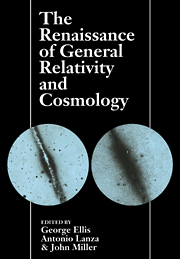 The Renaissance of General Relativity and Cosmology
The Renaissance of General Relativity and Cosmology Published online by Cambridge University Press: 15 December 2009
INTRODUCTION
In this talk I will discuss the hypothesis (Sciama 1990a) that most of the dark matter in the Milky Way consists of tau neutrinos whose decay into photons is mainly responsible for the widespread ionisation of hydrogen in the interstellar medium (outside HII regions). I introduced this hypothesis because there are several difficulties with the conventional explanation of the observed ionisation. This explanation involves photons emitted by O and B stars, supernovae etc. The two most important difficulties involve the large opacity of the interstellar medium to ionising photons and the large scale—height of the free electron density. The opacity arises mainly from the widespread distribution of atomic hydrogen in the interstellar medium, which makes it difficult for the ionising photons emitted by widely separated sources to reach the regions where the ionisation is observed. The scale—height of the electron density (as derived from pulsar dispersion measure data by Reynolds (1991)) is about 1 kpc, whereas the scale height of the conventional sources is only about one tenth of this.
Both of these problems would be immediately solved by my neutrino hypothesis since the neutrinos would be smoothly distributed throughout the interstellar medium and their scale—height would be expected to exceed 1 kpc.
To save this book to your Kindle, first ensure [email protected] is added to your Approved Personal Document E-mail List under your Personal Document Settings on the Manage Your Content and Devices page of your Amazon account. Then enter the ‘name’ part of your Kindle email address below. Find out more about saving to your Kindle.
Note you can select to save to either the @free.kindle.com or @kindle.com variations. ‘@free.kindle.com’ emails are free but can only be saved to your device when it is connected to wi-fi. ‘@kindle.com’ emails can be delivered even when you are not connected to wi-fi, but note that service fees apply.
Find out more about the Kindle Personal Document Service.
To save content items to your account, please confirm that you agree to abide by our usage policies. If this is the first time you use this feature, you will be asked to authorise Cambridge Core to connect with your account. Find out more about saving content to Dropbox.
To save content items to your account, please confirm that you agree to abide by our usage policies. If this is the first time you use this feature, you will be asked to authorise Cambridge Core to connect with your account. Find out more about saving content to Google Drive.